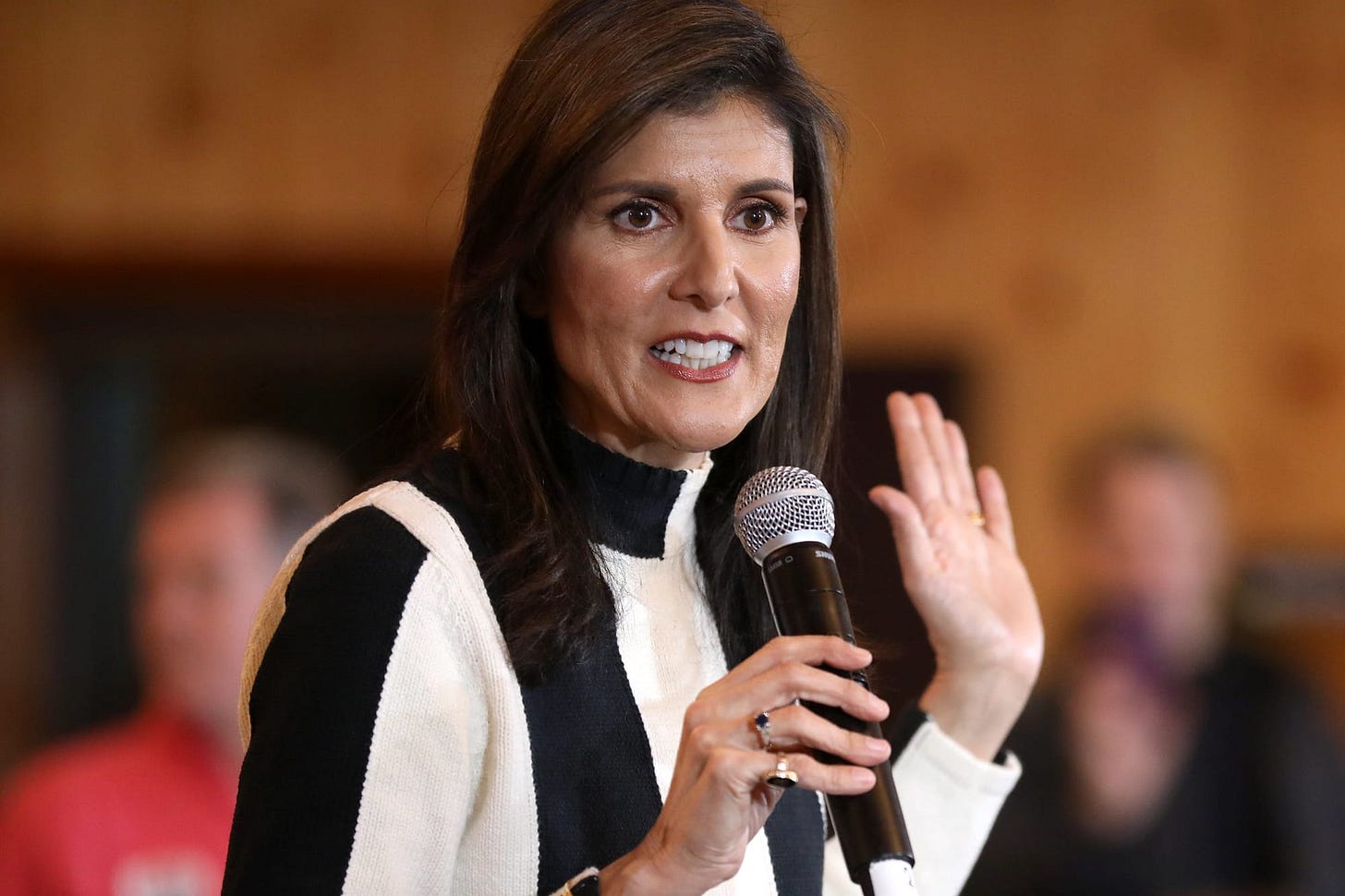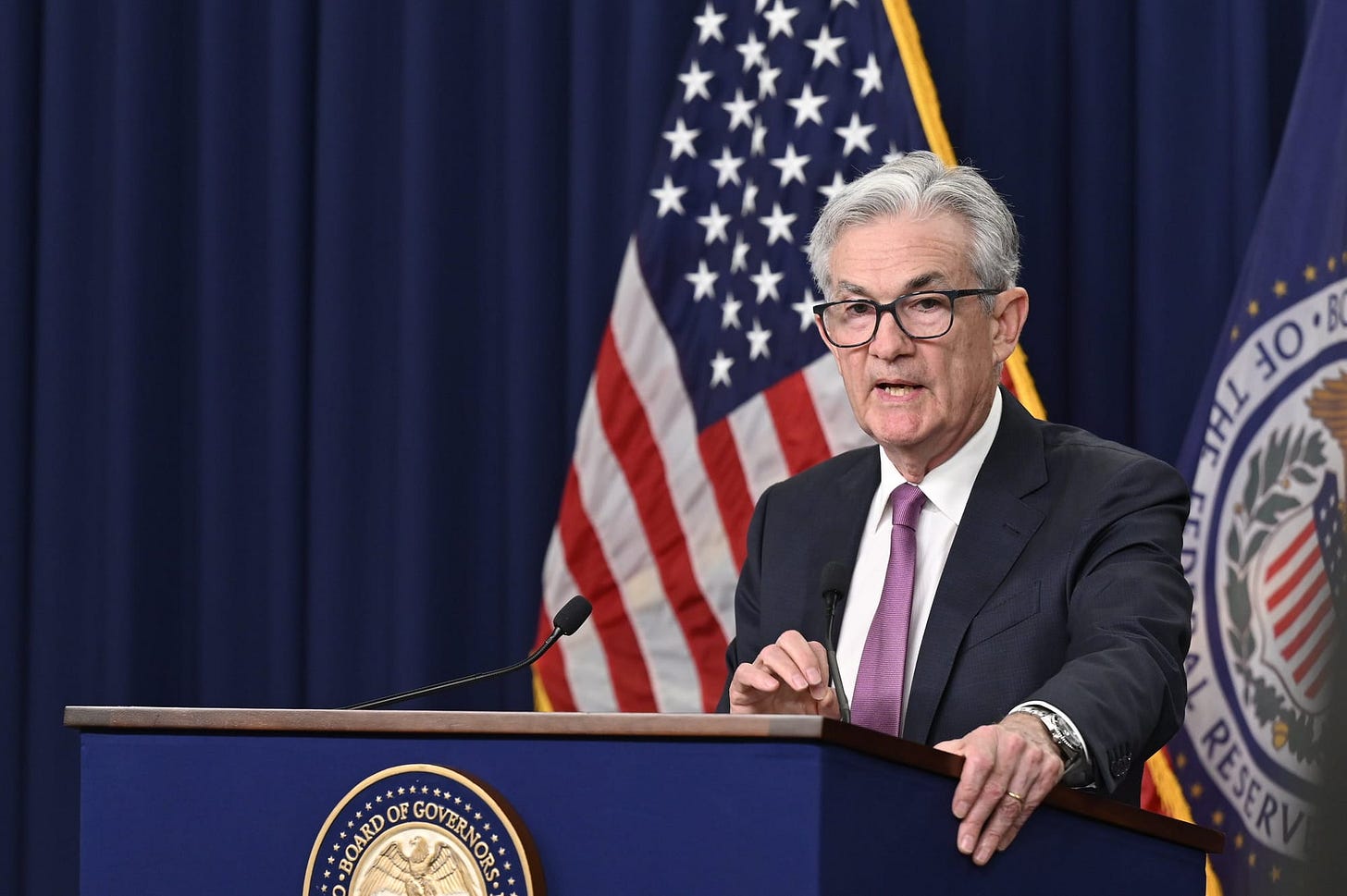Haley’s tough road ahead
Nikki Haley’s campaign says the media should wait to judge her until Super Tuesday. But will she even make it that far?
Good morning! It’s Thursday, February 1, 2024. Election Day is 278 days away. If this newsletter was forwarded to you, subscribe here. If you want to contribute to support my work, donate here.
Two polls have come out in the last 24 hours that typify the contradictions of this year’s Republican primary.
The first was a general election poll from Quinnipiac, which showed Joe Biden beating Donald Trump in a hypothetical head-to-head matchup, 50% to 44%... and Nikki Haley triumphing over Biden by almost the same margin, 47% to 42%.
Haley may win a much smaller share of Republicans against Biden than Trump does (79% compared to Trump’s 91%), but her increased share of Independents (among whom she wins but Trump loses) and Democrats (10% of whom say they would vote for her against Biden, compared to 2% who’d vote for Trump) is enough to fuel her five-point victory in the poll.
The second poll, though, is a Monmouth/Washington Post survey of the next major Republican primary contest, in South Carolina. In this poll, Trump creams Haley, 58% to 32%, beating her by more than 20 percentage points in her own home state. Republicans are being offered a candidate who scores well among the exact constituencies they have struggled with in the last 10 years — who could even eat into Biden’s share of the Democratic vote, per Quinnipiac — and are largely turning their nose at her, including the GOP voters in the Palmetto State who know her best.
To the extent Haley is still able to rate major media coverage — when was the last time you saw footage of a Haley rally or event? — she can usually be heard reminding voters of this dynamic. Her campaign has unveiled a new messaging push titled “Grumpy Old Men”: a series of online videos, digital ads and emails that seek to tie Trump, 77, and Biden, 81, together in contrast with Haley, 52.
Haley has also made the same electability point at a recent series of fundraisers, which is how she’s spent a lot of her time since New Hampshire. (Her campaign can survive two primary losses, clearly, but running out of money would be fatal.) At a recent conservative donor summit, where Trump’s advisers also present, Haley’s campaign manager made the case that a Trump nomination would not only cost Republicans control of the White House, but control of Congress as well.
But as persuasive as that argument might be among Republican megadonors, Republican voters aren’t buying it. In the Monmouth/Washington Post poll, 42% of South Carolina Republicans say Trump would “definitely beat” Biden in November if he were the nominee; only 21% say the same about Haley. Years of Trump claiming that he beat Biden last time — and his insistence that “any negative polls are fake news” — seem to have had their impact.
Occasionally, when I have written pieces along these lines noting that Trump is highly favored to be the Republican nominee, I receive emails in response reminding me that only 2.5% of the total GOP delegates have been awarded. Fair enough. (Currently, Trump has 33 delegates to Haley’s 17.) Haley’s campaign has also accused the “political class and the media” of wanting to “give Donald Trump a coronation.”
But let’s look at the upcoming contests where delegates will be allocated, and then you can judge for yourself:
* February 8: Nevada caucuses. A 2021 state law required both parties in Nevada to hold a presidential primary — but the statute didn’t say anything about whether the contest had to be binding. So Republicans will hold their mandated primary on February 6, and then actually award delegates based on the results of the caucuses two days later. However, the state GOP set a rule that any candidate who files to be on the primary ballot — as Haley did — will be barred from participating in the caucuses. So that will be 26 delegates automatically going to Trump.
On the same day, the Virgin Islands (which Ron DeSantis had been targeting) will also hold its caucuses. The territory’s four delegates will be awarded proportionally — unless any candidate receives more than 50% of the vote, in which case they will automatically receive all four.
* February 24: South Carolina primary. The Palmetto State has 50 delegates to give — 29 of which will be awarded to the statewide winner, likely to be Trump. The remaining delegates will be allocated by congressional district, with three delegates available to the winner of each district. If Trump wins the state by as large a margin as polls are showing, it is possible he will sweep all seven congressional districts and add all 50 delegates to his column, creating another Haley shutout.
* February 27: Michigan primary. Haley’s team has been pointing to Michigan as the next state she could perform well in, since it’s an open primary where Democrats and Independents can participate. (It’s notable that a recent Haley campaign memo almost only focuses on open primaries, making explicit the fact that non-Republicans are her only route to the Republican nomination.)
However, they’ve been less forthright about pointing out that only 16 of Michigan’s 55 delegates will be awarded in the primary. The rest will be allocated at a state convention on March 2; traditionally, state conventions favor the candidate with the most enthusiastic voters in the party base, which is undoubtedly Trump this year.
* March 2: Idaho and Missouri caucuses. Like the Virgin Islands, both contests will be “winner-take-most” — meaning delegates will be awarded proportionally, unless a candidate wins 50% of the vote, in which case they win them all. Trump met that threshold in both Iowa and Hampshire; do not surprised if he does so elsewhere, giving him additional delegate sweeps.
* March 3: Washington, D.C. primary. Here’s a contest you could actually see Haley winning, since D.C.’s Republican operative class is the prime audience for Haley’s electability message. But imagine Trump’s response if Haley’s only victory comes in the heart of The Swamp...
* March 4: North Dakota caucuses. Delegates will be awarded proportionally unless a candidate wins 60% of the vote, in which case they win them all.
And that brings us to Super Tuesday. The aforementioned Haley campaign memo stresses the fact that “there is significant fertile ground” for Haley in the 16 Super Tuesday states, again based on the fact of how many are holding open primaries.
But think about what we just walked through. In the month between now and Super Tuesday, Haley might only pick up just a handful of delegates: perhaps three from a favorable district in South Carolina, a few from Michigan’s primary, and some from the D.C. primary as well.
Trump, meanwhile, could conceivably gain in the neighborhood of 200 delegates: all 26 from Nevada, most of South Carolina’s 50, and all 115 from Idaho, Missouri, and North Dakota if he meets their winner-take-all thresholds. Will Haley even make it to Super Tuesday if she’s running so far behind in delegates by then?
Keep in mind that Haley faces an uphill battle by design. Republican primary rules — which allow for winner-take-all contests (unlike Democratic primaries, which are all proportional) — have long been stacked in favor of the frontrunner, but this year’s allocations are especially so.
I wrote months ago about how Trump’s campaign had successfully lobbied many state parties to put on winner-take-all or winner-take-most contests this year; now, we are about to see the fruits of those efforts in real time. Haley’s window to win the Republican nomination is closing, and fast.
More news to know.
Congress: The House passed the bipartisan Tax Relief for American Families and Workers Act on Wednesday in a sweeping 357-70 vote. The package will expand the Child Tax Credit, extend a trio of corporate tax breaks, and enhance an affordable housing credit. Read more about the bill in yesterday’s newsletter
Campaigns: Joe Biden’s campaign outraised Donald Trump’s in the final quarter of 2023 ($33 million to $19 million), entering 2024 with about $46 million cash on hand to Trump’s $33 million. Trump’s campaign spent more than it raised in 2023, including about $50 million in donor funds spent on legal fees over the course of the year.
Middle East: Secretary of State Antony Blinken has asked staffers to look into options for possible recognition of a Palestinian state after the war in Gaza ends, per Axios. The UK said this week they are considering the same step.
Economy: The Federal Reserve held interest rates steady Wednesday and signaled that rate cuts could come soon as inflation eases and consumer confidence grows. “This is a good situation,” Fed chair Jerome Powell said. “Let’s be honest: This is a good economy.”
Tech: Senators from both parties bashed the CEOs of X, Meta, TikTok, Snap, and Discord at a hearing on online child safety. “You have blood on your hands,” Sen. Lindsey Graham (R-SC) told Mark Zuckerberg, who later rose to the families of children who have suffered abuse on his app.
China: FBI Director Christopher Wray warned at a House hearing that China is positioning itself to “wreak havoc” by launching cyberattacks against U.S. electrical grids, water systems, and other critical infrastructure.
Climate: John Podesta, a longtime Democratic operative and climate adviser, will take over John Kerry’s portfolio as President Biden’s top international climate envoy.
Law: A Trump-appointed federal judge dismissed Disney’s lawsuit against Gov. Ron DeSantis (R-FL) that claimed the company’s speech rights were targeted when Florida revoked its self-governing status after speaking out on LGBT rights.
Education: Elementary and middle school students are “nowhere close” to fully catching up from the learning loss suffered during Covid-era school closures, according to a new national study.
The day ahead.
White House: President Biden will attend the National Prayer Breakfast this morning. Later, he will travel to Detroit, Michigan, where he will headline a campaign event that is expected to highlight his recent United Auto Workers (UAW) endorsement. Biden’s visit to the key battleground state comes amid concerns that Arab-American voters in the area may hold back voting for him over his handling of the Israel-Hamas war.
Congress: The Senate will vote on confirmation of Lisa Wang to be a Judge of the U.S. Court of International Trade, which handles civil suits relating to U.S. customs and international trade. The House will vote on the Protect Our Communities from DUIs Act, which would make a DUI arrest grounds for deportation for an illegal migrant.
Campaign trail: Nikki Haley will hold events in Columbia and Hilton Head, South Carolina. Robert F. Kennedy, Jr. will hold a Black History Month event in Los Angeles.
Thanks for reading.
I get up each morning to write Wake Up To Politics because I’m committed to offering an independent and reliable news source that helps you navigate our political system and understand what’s going on in government.
The newsletter is completely free and ad-free — but if you appreciate the work that goes into it, here’s how you can help:
Donate to support my work or set up a recurring donation (akin to a regular subscription to another news outlet).
Buy some WUTP merchandise to show off your support (and score a cool mug or hoodie in the process!)
Tell your family, friends, and colleagues to sign up at wakeuptopolitics.com. Every forward helps!
If you have any questions or feedback, feel free to email me: my inbox is always open.
Thanks so much for waking up to politics! Have a great day.
— Gabe





